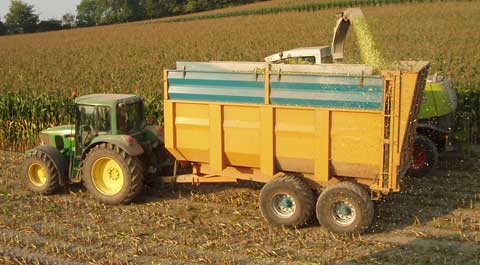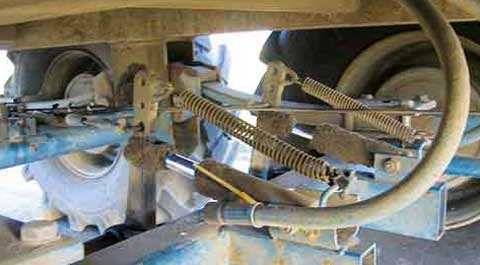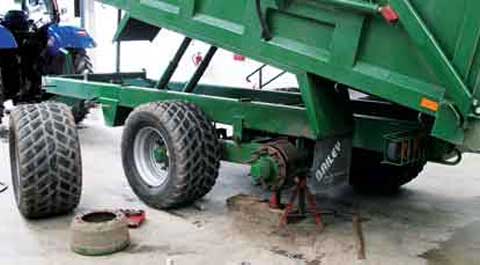Trailer brake safety

Making sure the brakes on your current trailers are well maintained and effective – and that your new trailer purchase is up to spec – will cut costs and reduce accidents, says Tony Mitchell, from the Health and Safety Executive.
A study (PDF) of agricultural trailer braking showed that most trailers failed to meet basic safety requirements.
The research report, jointly funded by HSE, DfT and industry, examined a range of in-service trailers and trailed equipment to identify their braking performance, which was tested again after carrying out a service and adjustment.
Most of the trailers failed to meet basic requirements – some even after adjustment.
The report also highlighted the business benefits from selecting and maintaining the right equipment and identifying the cost savings associated with good practice.
Key findings
Poor trailer brake performance, whether air or hydraulic, results in:
* Low braking performance, taking longer to stop and loss of control
* Possible total brake failure
* Costly tractor repair bills
* Breaking the law.
The research has shown that many trailers fall well below this due to:
* Designers failing to specify adequate braking capacity
* Manufacturers fitting poorly matched actuation systems
* Users’ lack of maintenance and adjustment.

The research project was set up to identify the relevant costs and benefits so that a more effective message could be developed. Some of the key ones are set out below:
* 75% of the kinetic energy comes from the trailer, but tractors are expected to do most of the braking.
* Modern tractor/trailer combinations can travel at 30mph (48 kph) and have up to 2.5 times more kinetic energy to deal with during braking.
* It is usually cheap to maintain trailer brakes and improve their efficiency
* It is possible, and can be cost-effective, to upgrade trailers to meet higher specifications.
* Higher speeds and heavier loads mean brakes have a harder job to do.
Most users won’t know what the braking efficiency of their trailers is, or is meant to be. Unlike tractors, which have to undergo formal Type Approval, there is no such requirement for trailers.
This may change in the future but it doesn’t help those with trailers now, or those planning to buy one soon. You might also find your tractor manufacturer less sympathetic to damage caused by incompatible braking systems.
It can be cost-effective to upgrade your existing trailer brakes.

If you are considering buying a new trailer there are a couple of points worth noting. It is a good idea to ask the manufacturer for evidence that its designs have been tested against specification.
There are, undoubtedly, some benefits for pneumatics over hydraulics but they are both simply actuation systems and need a good foundation brake – and both require adequate maintenance.
Existing trailers can be upgraded but you do need to start with a good foundation brake (axle, drum and shoes) that is capable of generating sufficient brake force and dealing with the heat involved. If you have the knowledge and skill you can change several of the key components yourself to improve performance.
However, for heavier trailers, increasing brake efficiency might also mean you need to fit a load-sensing system to reduce the chances of wheel lock when unladen and reduce tyre wear.
Generally a load sensor is simply a valve that reduces actuation pressure in response to deflection in the trailer suspension.
But although the principle is simple, ensuring that it is properly set up can be more complicated – for both new and older trailers (more detail can be found in the research report).
AND FINALLY…
A failsafe system – ie one that will engage the trailer brakes if it becomes detached – is essential if you operate at higher speeds. This is also not a bad thing to have at normal speeds on heavy trailers either.
To meet Type Approval requirements, tractors generally have very good braking efficiency and have to be able to cope with the mounted load they will carry.
However, this is not the case in the event of engine failure where a tractor only needs to provide a reasonable amount of emergency braking for itself.
So if you find yourself with a heavy trailer in tow going downhill, or stopped on a slope and the engine stalls, you will also find that you probably have very little braking. A failsafe system would at least allow the trailer brakes to be applied.
What can the industry do to deal with the problem?
Users:
* Check trailer brakes regularly and keep them adjusted – this will at least make sure you are getting the best from them.
* Buy trailers with good brakes that are easy to maintain and have load-sensing/failsafe systems.
* Ask suppliers to support their claims with evidence of testingManufacturers:
* Build trailers that have adequate braking and carry out tests to ensure actual performance meets design requirements
* Fit systems and equipment that allow ease of maintenance and make sure load-sensing systems are correctly set.
* Provide easily accessible information for service and adjustment
Suppliers/dealers:
* Sell trailers with better brakes
* Ensure that customers are provided with information about the trailer braking system and how it will match their existing tractors
* Provide a trailer brake maintenance and testing service.

